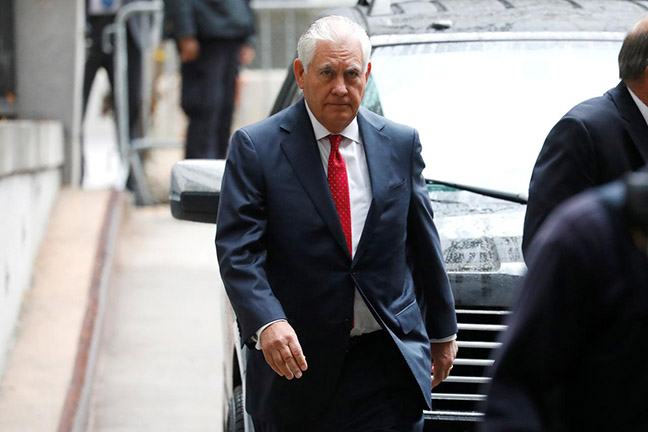NEW YORK, (Reuters) – Former Exxon Mobil Corp Chief Executive Officer Rex Tillerson yesterday denied misleading investors about how the oil major measured potential costs of climate change, as he testified in a closely watched civil lawsuit brought by New York’s attorney general.
The case, filed last October in Manhattan state court, last week became the first of several climate-related lawsuits against major oil companies to go to trial.
The attorney general alleges that Exxon caused investors to lose up to $1.6 billion by falsely telling them it had properly evaluated the impact of future climate regulations on its business. The company used a “proxy cost” of up to $80 per ton of carbon emissions in wealthy countries by 2040, but internally used figures as low as $40 per ton or none at all, the attorney general has said. Exxon has assailed the claims as false and politically motivated.
Under questioning from Kim Berger, a lawyer for the state, Tillerson testified that the proxy cost represented a “macro level” assessment of the likely effect of future carbon regulations around the world on total demand for fossil fuels, and was incorporated into a data guide used throughout Exxon.
Separately, he said, the company would sometimes evaluate greenhouse gas costs at a “micro level” for specific projects, when appropriate.
“What we’re really trying to do is be the most realistic, present our best view of how this is going to turn out,” he said.
Tillerson went on to offer a more full-throated defense of the company when he was questioned by its lawyer, Theodore Wells, saying all the allegations in the case were false.
He said Exxon would never have any incentive to lowball greenhouse gas costs internally. “We’d be misinforming ourselves,” he said.Tillerson served as Exxon CEO from 2006 to 2017, and U.S. secretary of state under President Donald Trump from 2017 to 2018.
Last Thursday, just two days after the New York trial began, Massachusetts filed a similar lawsuit accusing Exxon of misleading investors and consumers for decades about the role fossil fuels play in climate change.
Both Massachusetts and New York began investigating Exxon after news reports in 2015 saying company scientists had determined that fossil fuel combustion must be reduced to mitigate the impact of climate change.
Exxon and other oil companies including BP Plc, Chevron Corp and Royal Dutch Shell Plc face lawsuits by cities and counties across the United States seeking funds to pay for seawalls and other infrastructure to guard against rising sea levels brought on by climate change.
The companies have said in court filings that they cannot be held liable for climate change.






